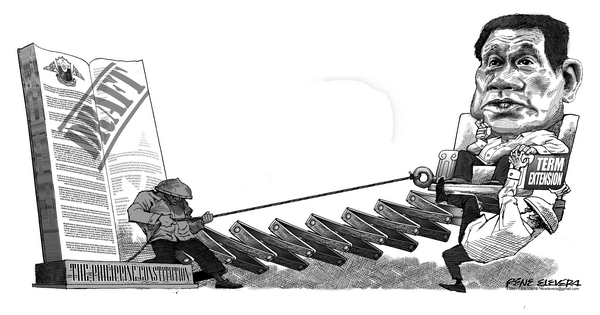
The consultative committee appointed by President Rodrigo Duterte should distribute to the Filipino people as soon as possible their proposed constitution for a federal government so that voters can study well whether to reject or ratify it.
This early, Christian Monsod, a framer of the 1987 Constitution has sounded the alarm over the absence in the draft charter of a prohibition on seeking new mandates for current officials.
Monsod told a forum organized by the Philippine Center for Investigative Journalism that he obtained a copy of the draft charter from reliable sources.
Should the draft constitution be approved, President Rodrigo Duterte would not be barred from seeking two four-year terms — starting in 2022 and in 2026.
Whether Filipinos want Duterte to remain in power for another eight years after his term expires, or whether they want any other leader to last as long in office is just one of the things they have to think carefully about.
Do the people want more of a chief executive with a stellar performance at uttering expletives, at enabling a culture of bloodshed and impunity, and at breaking promises?
Will they continue to accept that the new fear of loitering and fear of policemen passes for discipline? Will they continue to accept ranting and raving as substitutes for formal decrees or legislation?
Note how a spur-of-the-moment expression of intent to throw
loiterers into the river resulted in the arbitrary apprehension of more than 9,000 people.
Filipinos also need to be vigilant in the face of the transitory provisions of the draft constitution. The Duterte administration, like the man himself is not famous for sticking to promise.
Malacañang can always insist that if approved, the new constitution will be adhered to by the President, but who is to stop him and the Federal Transition Commission from abusing the near-absolute power that will be granted to them during the transition period?
This transition commission, headed by the President, shall, to shift the nation to new system of government, “promulgate the necessary rules, regulations, orders, decrees, proclamations, and other issuances, do all acts to implement the same, and resolve all issues and disputes that may arise therefrom.”
The commission is to “exercise all powers necessary and proper to ensure a smooth, speedy and successful transition.”
That is a lot of unchecked power.
The people will have to decide whether or not they will surrender so much of their right to self-determination, so much of their freedom to chart the course of their future to so small a group of this President’s appointees.
Recent Philippine history under the current dispensation has left plenty of clear clues.